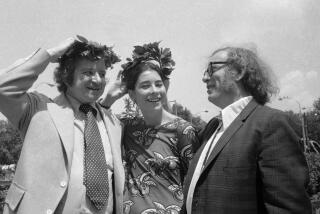Barry Hannah dies at 67; award-winning Southern author
Author Barry Hannah, whose fiction was laced with dark humor and populated by hard-drinking Southerners, died Monday at his home in Oxford, Miss. He was 67.
Hannah’s son Barry Jr. told the Clarion Ledger newspaper in Jackson, Miss., that his father died of an apparent heart attack.
Hannah’s first novel, “Geronimo Rex,” was published in 1972. It received the William Faulkner prize for writing and was nominated for a National Book Award.
His 1996 short story collection, “High Lonesome,” was nominated for a Pulitzer Prize.
In a review of the 2001 novel “Yonder Stands Your Orphan,” Publishers Weekly described Hannah’s writing as “Tennessee Williams, Flannery O’Connor, Harry Crews, Peter Dexter and Clyde Edgerton all squished together, baked in hush-puppy batter, dipped in honey and sprinkled with Jim Beam.”
Michael Harris, reviewing “High Lonesome” in The Times, praised Hannah’s distinctive style and voice.
“Southern writers can be likened to a pack of hounds, crashing through the Mississippi canebreaks in pursuit of William Faulkner, still the biggest bear in the woods. . . . Few, though, are bred as singularly as Hannah.”
His style, Harris wrote, “demands that we make up our mind about it. . . . It makes us itch, like ticks on a dog -- the deliberate crudity of syntax and punctuation, sentences telescoped inside one another like railroad cars in a head-on wreck, dialogue blurred into narration, a mongrel mix of formal diction and dialect.”
Novelist and Mississippi native Richard Ford called Hannah “a shooting star.”
“Barry could somehow make the English sentence generous and unpredictable, yet still make wonderful sense, which for readers is thrilling,” Ford said from his home in Maine.
“You never knew the source of the next word. But he seemed to command the short story form and the novel form and make those forms up newly for himself.”
Longtime friend Malcolm White, director of the Mississippi Arts Commission, said Hannah “loved words, fishing, his family and going fast.”
“Barry was Mississippi’s irreverent poet of the dark side, our rebellious, misfit uncle of the nightlife, the voice of the unrehearsed and the unapologetic outburst in the corner of the room,” White said.
Born in 1942, Hannah was reared in Mississippi. He graduated in 1964 from Mississippi College in Clinton and later earned a master’s degree in creative writing at the University of Arkansas.
He taught writing at the University of Mississippi for more than 25 years and spent time as writer in residence at the University of Iowa, University of Montana-Missoula and Middlebury College in Vermont.
He also worked for director Robert Altman, then wrote about his experiences in the 1989 autobiographical novel “Boomerang.”
In 2003, Hannah was given the PEN/Malamud Award, which recognizes excellence in the art of short fiction.
“The main part of my stories always comes out of life,” Hannah said in a Contemporary Authors profile.
“I’m terribly affected by something, obsessed with it, or find a situation I can’t forget, and then the rest is imagination. . . . I have to do quite a bit of life or I just don’t feel like I have anything to say.”
Ford said he and Hannah often spoke about the idea of “Southernness.”
“We circled the whole issue of Southernness differently,” said Ford, whose novel, “Independence Day,” won the 1996 Pulitzer Prize for fiction. “I think he embraced it in a way that he took sustenance from. He chose to live in William Faulkner’s town, chose to stay in the South, to his great strength and credit. But he was not a regional talent. He was much larger than that.”
Hannah’s survivors include his wife, Susan; and three children.
More to Read
Start your day right
Sign up for Essential California for the L.A. Times biggest news, features and recommendations in your inbox six days a week.
You may occasionally receive promotional content from the Los Angeles Times.






